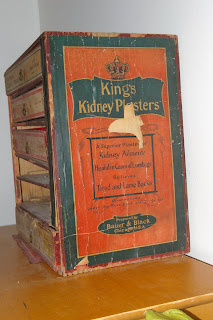I am in my early thirties. And already, I've seen a fair number of things come and go. I remember floppy disks that actually flopped, for example. I remember cassette tapes. I remember listening to my first-ever "compact disc" recording at my music teacher's house during a lesson, and how the quality of it was so remarkable that it moved my father to put his book down and come in from the parlor to hear it -- something parents weren't supposed to do during lessons. I remember not only the newness of cell phones, but the newness of cordless phones. Hell, I remember when cable and the microwave oven came to our neighborhood for the first time!
So I guess it's not surprising that technology is making its inevitable march towards the decidedly analog book. That's what today's BTT is all about:
Something a little different today–
First. Go read this great article from Time Magazine: Books Gone Wild: The Digital Age Reshapes Literature. (Well worth reading.)
Second. Stop and think about it for moment. Computers and digital media are changing everything we do these days, whether we realize it or not, and that includes our beloved books.
Third. DISCUSS!
To be different, today, I’d love to see a discussion here, in the comments, rather than scattered amongst all our separate blogs. Because this is an issue that affects ALL of us, and I’d really like to see us hash out the merits and demerits of this evolution.
Tell us what you think. Do you have an ebook reader? Do you read ebooks on your computer? Do you hate the very thought? How do you feel about the fact that book publishing is changing and facing much the same existential dilemma as the music industry upon the creation of MP3s?
Sure, feel free to write about this on your blog, but honestly–I’d love to see an in-depth discussion, and you can’t do that by flitting about the internet reading 100 different, individual essays. You can only get that by having the back and forth of conversation.
So, today, USE THE COMMENTS!
(And, seriously, am I the only one having trouble finding the time to visit all the commenters’ blogs on Thursdays? As nice as it is to visit everyone, it’s a time-intensive commitment!)
I read the article in Time, and it was interesting (although I could have done without the constant, ADD-inducing asides: See 2008's Top Video Games! See Pictures of Students Texting! Bleh!) From Deb's description, I expected the article to focus on the consumer side of the issue. E-books have long been predicted to serve as the demise of traditional books. In the mid-nineties, though, I remembered reading an argument from someone intelligent (can't remember who, but someone's opinion I respected) that it wouldn't happen because there was no technological advantage to reading on a device. Books, in paper form, are portable and durable. They can go places electronic devices can't go, like bathtubs, beaches, and airplanes during takeoff.
I quit worrying at that point. But that argument was advanced before there were Blackberries and sophisticated cell phones. Personally, I think that librarians and English teachers who wind up in Hell will be spending most of their time trying to read and understand complex, lengthy books on cell phones. But that's just me, I don't even own one and don't really care to.
Surprisingly, though, the article focused on the production side of publishing. I'd read a New Yorker article about Japanese novels written entirely on cell phones. The self-publishing phenomenon is here, too. It's no longer the purview of writers with little talent, or with such a narrow range that no major publisher would pick them up (the Complete History of Bronze Pavement Markers in the Northern Section of East Bumfuck, 500p., no illustrations). Nowadays, all the kids are doing it. I suppose us bloggers are doing it in our own way, too.
The internet has had profound effects on most businesses. The newspaper industry is hurting. The music industry is such a shambles that they've taken to harassing small museums that play CDs for licensing fees. So I guess it's no surprise that all this self-publishing and downloading has begun to affect the publishing industry, too. Who knows how it will all shake down. I think it's neat that more people are able to get their voices heard. At the same time, I love books in their traditional form. I like the way they smell, the way they feel. I like being able to jump around easily in them, re-reading the parts I like the best, hopping back a few pages to refresh my memory about a character's backstory. I think because of this, it will be a while before we see their demise. Here's hoping, anyway.




